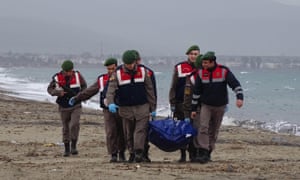Turkish police have uncovered a factory producing fake lifejackets, shining a light on a booming cottage industry that has emerged as a byproduct of the refugee crisis and heightened the risks for those hoping to reach Europe by sea.
Police allegedly seized 1,263 lifejackets filled with non-buoyant materials from an illegal workshop in Izmir that employed two Syrian children, according to Agence France-Presse and Dogan news agencies.
The raid came in the same week that the bodies of more than 30 people washed up on Turkish beaches, having drowned in their attempt to reach Greece. Some of the dead were pictured wearing lifejackets, leading to suspicions that they may have been fake.
In two visits last year to Izmir, a major smuggling hub on the Turkish coast, the Guardian wasrepeatedly offered counterfeit lifejackets by salespeople openly touting their wares on a prominent shopping street close to two police stations.
In an attempt to convince buyers, shops sell jackets branded with the word “Yamaxa”, a misspelling of the Yamaha brand, whose products cost about twice as much as a fake. Trade is so high that some shoe and clothes shops sell lifejackets as their primary products.
“We only sell two or three pairs of shoes a day,” one shop assistant told the Guardian in November. “But we’re still selling between 100 and 300 lifejackets. In the summer sometimes it was a thousand – the factories couldn’t keep up.”
After the agreement of a multibillion-euro deal between the EU and Turkey, Turkish police have slightly increased their operations against people involved in the wider smuggling business. But the flow of refugees between Turkish and Greek shores remains at record levels, with about 2,000 braving the journey every day this month, roughly an elevenfold increase on last January’s levels.
